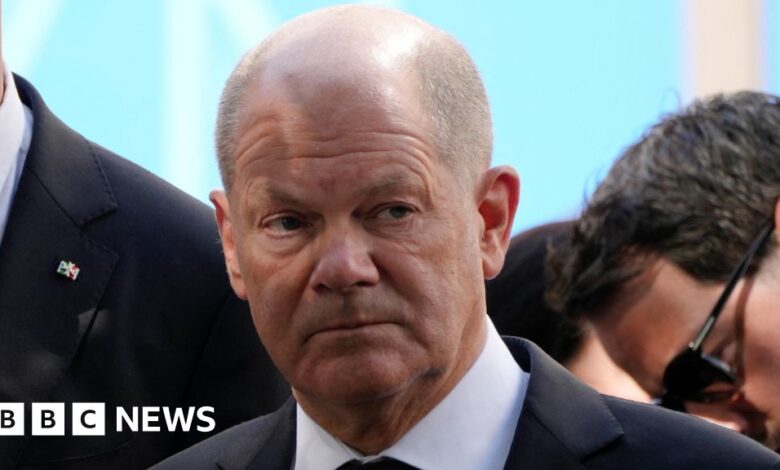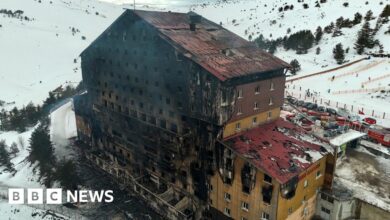Scholz urges ‘firewall’ to stop far right

German Chancellor Olaf Scholz has called on mainstream parties not to support the far-right Alternative for Germany (AfD), which won a landslide victory in the eastern state of Thuringia in regional elections on Sunday.
The result gives the far right its first victory in a state parliamentary election since World War II.
The AfD also came second in another major state election on Sunday, in the more populous neighbouring state of Saxony.
The AfD has been designated as far-right extremist in both Thuringia and Saxony. Björn Höcke, the leader of the AfD in Thuringia, has previously been fined for using a Nazi slogan, although he denies doing so intentionally.
On Monday, Mr Scholz called on other parties to prevent the AfD from taking power by maintaining a so-called firewall against the party.
“All democratic parties are now called upon to form a stable government without right-wing extremists,” he said, calling the result “bitter” and “worrying”.
The AfD has been classified as a right-wing extremist by domestic intelligence in Thuringia and Saxony. In May, a German court ruled that intelligence officials were justified in placing the AfD on surveillance for suspected extremism.
AfD co-leader Alice Weidel said voters in Thuringia and Saxony had given her party “a very clear mandate”.
She urged parties to ignore Mr Scholz’s call to build a government coalition without the AfD, saying doing so would “undermine the democratic participation of the majority of the population”.
“Firewalls are not democratic,” Ms. Weidel added.
Without the support of other parties, the AfD cannot govern in Thuringia.
The second-largest party, the conservative CDU, has made it clear that it will not consider a coalition with the far right.
Mathematically, the conservatives would need support from left-wing parties to form a majority.
They have previously refused to work with the left-wing Die Linke party, meaning they may have to turn to Sahra Wagenknecht’s BSW party, a more radical left-wing populist party, to form a governing coalition – an unpalatable option for many in the CDU.
Mr Höcke, the AfD’s top candidate in Thuringia, believes there are many CDU voters who would be happy if they worked together.
In any case, with more than 30% of the vote, the AfD has a so-called “blocking minority” – meaning they will be able to block the appointment of new judges or any constitutional changes.
Any alliance that emerges is likely to be very unstable.
In Saxony, the conservatives won 42 seats, ahead of the AfD with 41 seats, while Sahra Wagenknecht’s party came in third with 15 seats.
In Thuringia, Mr Scholz’s Social Democrats (SPD) won just six seats, with none for his coalition partners the Greens and the Free Democrats (FDP). The SPD also did poorly in Saxony, where they came fifth.
The election highlighted the unpopularity of Germany’s ruling “traffic light” coalition, so named because of its party colours of red, yellow and green.
Ms Weidel said people had “voted out” of the coalition and called on Mr Scholz and his partners to “pack up and leave, because voters want a different government, they want different politics”.
The biggest issue for those who voted for the AfD on Sunday was immigration, especially refugees and asylum rights.
The federal president of the joint organization of Turkish communities in Berlin, Aslihan Yesilkaya-Yurtbay, said the election results were “shocking and frightening”.
“The future of citizens with migrant backgrounds in this country is in question,” she said.
The AfD also wants to stop supplying weapons to Ukraine, like Sahra Wagenknecht’s BSW party.
About five million Germans in the east are eligible to vote on Sunday.
The third eastern state, Brandenburg, goes to the polls in three weeks and although the AfD is leading in opinion polls, the Social Democrats and the conservatives are only a few points behind.



